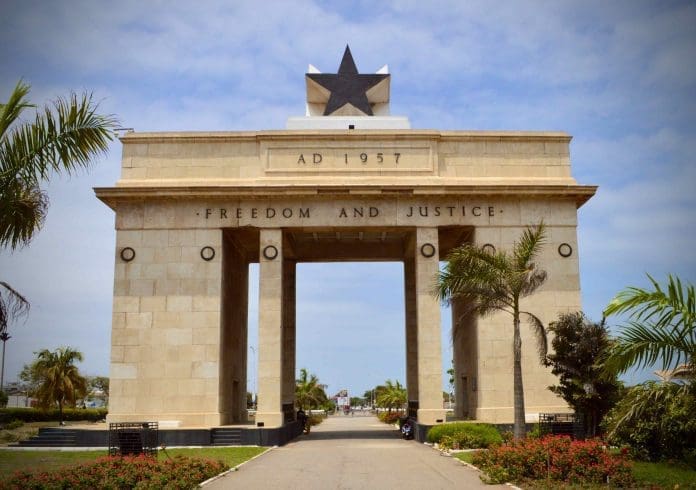
Eighteen Black youth in care with Toronto’s Catholic Children’s Aid Society experienced what many described as a “spiritual homecoming” during their two-week Freedom Walk: Cultural Journey to Ghana this August, connecting with ancestral roots at historic sites that shaped the African diaspora.
The groundbreaking initiative, organized by CCAS’s It Takes a Village committee and funded through over $100,000 from the Catholic Children’s Aid Foundation, took participants from August 7-20 to transformative locations including Cape Coast Castle, Assin Manso Slave River, and the Ashanti Kingdom.
For youth who often grow up without clear family connections, the journey represented far more than tourism. “Walking along black routes, one is confronted with both the pain and the resilience that define the African diaspora,” reflected participant Emerald Kassa, describing her experience as “more than just a journey across the ocean, it was a homecoming.”
The emotional weight of visiting Cape Coast Castle and Elmina Castle, where millions were confined before forced Atlantic crossings, left profound impacts on participants. Child Protection Supervisor Charles Dannsah-Appiah, who led the group, described witnessing intense emotions as youth processed ancestral trauma while discovering their own resilience.
“Walking through the dungeons and learning how enslaved people were treated as commodities brought intense sadness and anger,” Dannsah-Appiah explained. The visit to Assin Manso, discovering it as the site of enslaved people’s last bath before being sold, proved especially powerful for many participants.
Rather than simply confronting painful history, the experience became transformative. Youth supported each other through difficult moments, prayed together, and channeled emotions into empowerment and learning. Many described feeling transformed, with some calling Ghana their “true home” and expressing hopes to return with future families.
The initiative emerged from CCAS’s commitment to helping Black youth in care connect with cultural heritage under CEO Priscilla Manful’s leadership. Ghana’s historical significance in the transatlantic slave trade and rich cultural value made it an ideal destination for the It Takes a Village group’s long-held vision of taking youth to Africa.
Selection involved careful assessment by frontline staff and caregivers to ensure genuine interest and readiness. The process prioritized youth motivation and goals while evaluating trip feasibility for each participant.
Beyond visiting historic sites, youth explored vibrant Ghanaian communities preserving traditions of music, art, and spirituality. They showed compassion by sharing food with underprivileged children, explored local markets with enthusiasm, and gained deeper appreciation for both their Canadian lives and African heritage.
Many participants were surprised by Ghana’s modernity compared to their previous perceptions, shifting perspectives about the continent. One initially reluctant youth later declared he would never miss such an opportunity again, demonstrating the journey’s transformative impact.
The program faced typical organizational challenges including securing funding, selecting participants and chaperones, coordinating with tour companies, and managing travel documentation. Having both CEO Manful and Supervisor Dannsah-Appiah as Ghanaians proved invaluable for navigation and cultural coordination.
Lessons learned included the need for more rest time between excursions in future trips, though the comprehensive itinerary kept youth engaged throughout. CCAS plans to expand participation so more Black youth can benefit from similar cultural experiences.
The Freedom Walk aligns with CCAS’s broader summer initiatives connecting youth to heritage and faith. The organization also conducted a separate Jubilee pilgrimage to Rome, demonstrating comprehensive commitment to youth development through cultural and spiritual connections.
For Kassa, the experience reinforced that “Black Routes are not only about survival, triumph and reconnection” but showcase the creativity, leadership, and unity that have sustained African peoples through centuries of struggle. Ghana became not just a destination but “a living classroom and a spiritual homecoming.”
The program underscores how understanding the global Black experience requires recognizing everlasting African ties. As these eighteen youth return to school with extraordinary summer stories, they carry renewed cultural pride, strengthened identity, and deeper connections to both their heritage and each other.
Staff plan to build on journey lessons through continued support, ensuring the transformative experience contributes to participants’ ongoing development. The initiative demonstrates how targeted cultural programming can profoundly impact youth in care, providing roots and identity often missing from their experiences.
As Dannsah-Appiah reflected, the work extends beyond safety and well-being to helping youth “see beyond” their circumstances, connecting them to broader histories, cultures, and communities that shape their identities and futures.
